Unit4 I used to be afraid of the dark. SectionA(3a-3c) 课件(共37张PPT)
文档属性
| 名称 | Unit4 I used to be afraid of the dark. SectionA(3a-3c) 课件(共37张PPT) |

|
|
| 格式 | zip | ||
| 文件大小 | 2.3MB | ||
| 资源类型 | 试卷 | ||
| 版本资源 | 人教新目标(Go for it)版 | ||
| 科目 | 英语 | ||
| 更新时间 | 2019-09-26 00:00:00 | ||
图片预览

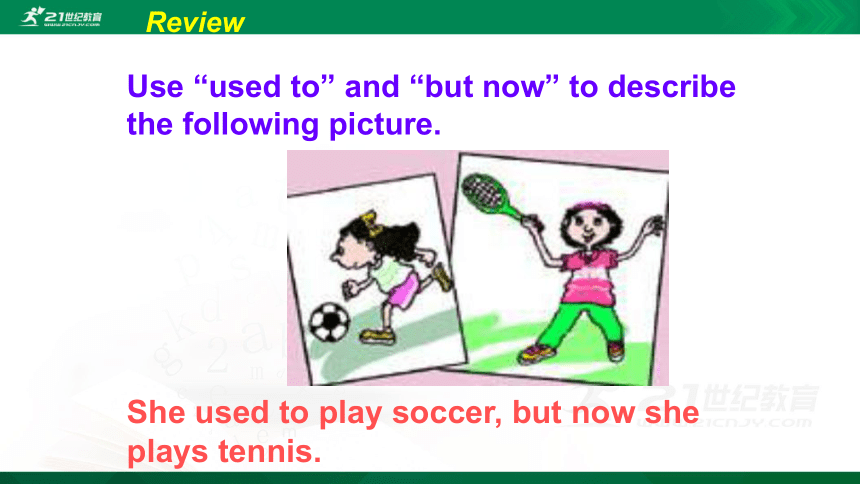
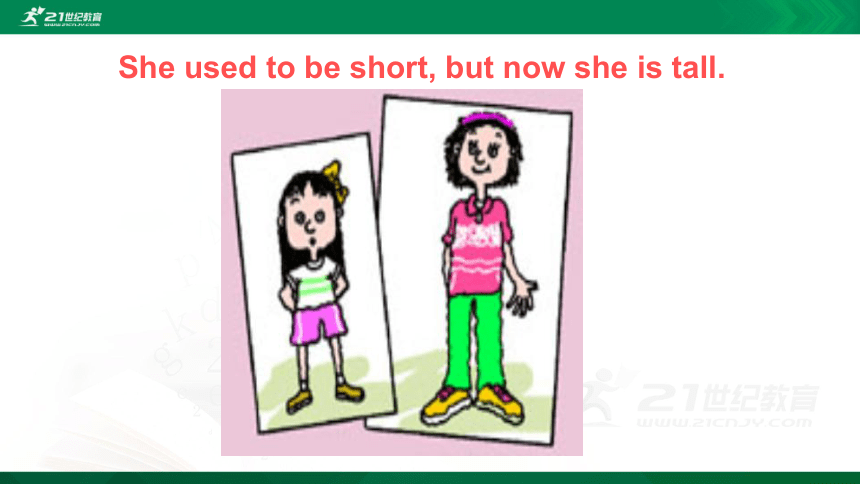
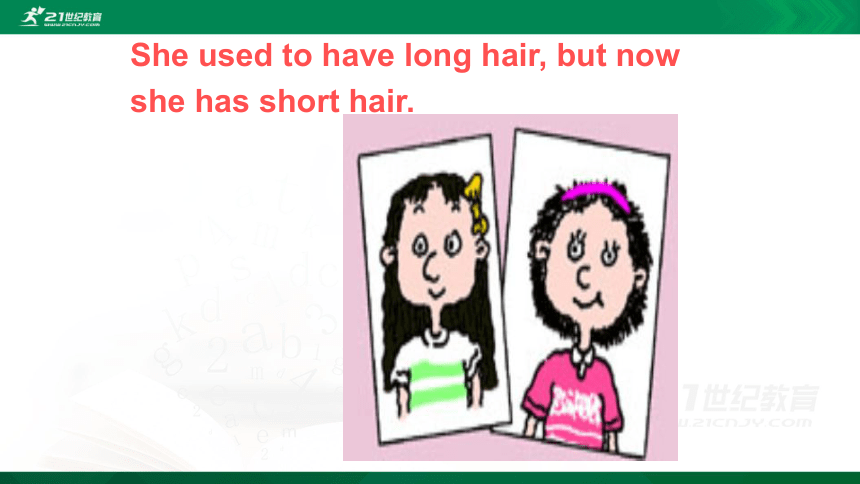
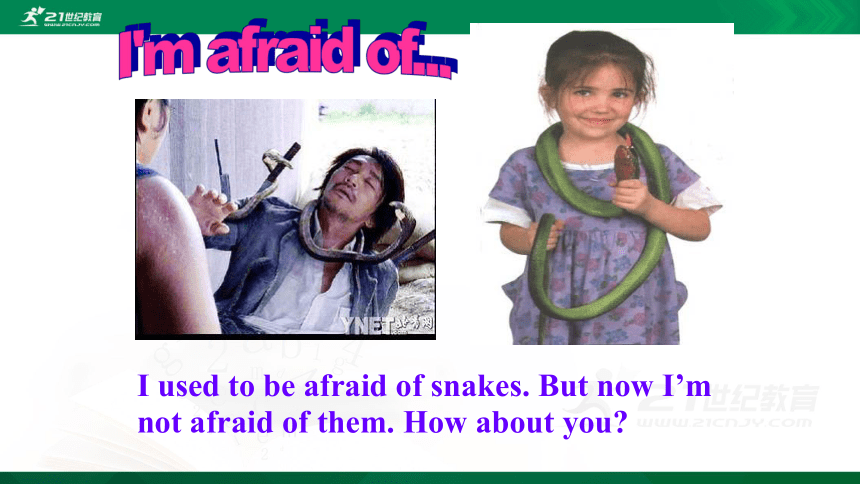
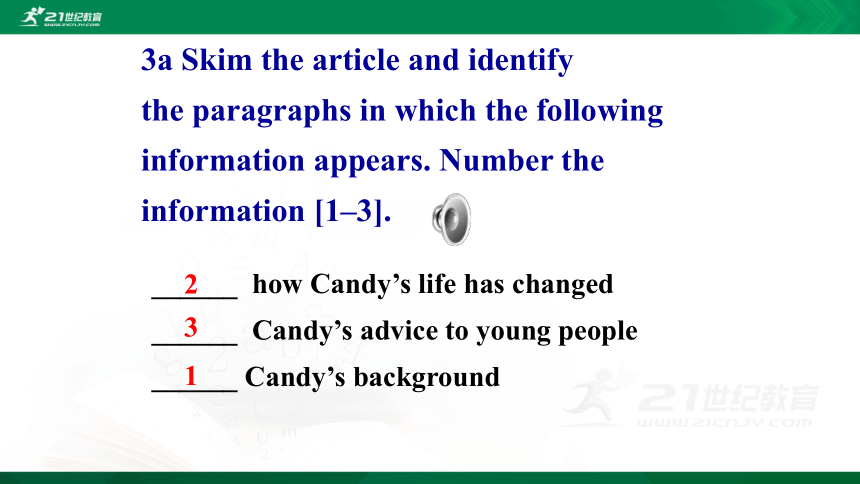
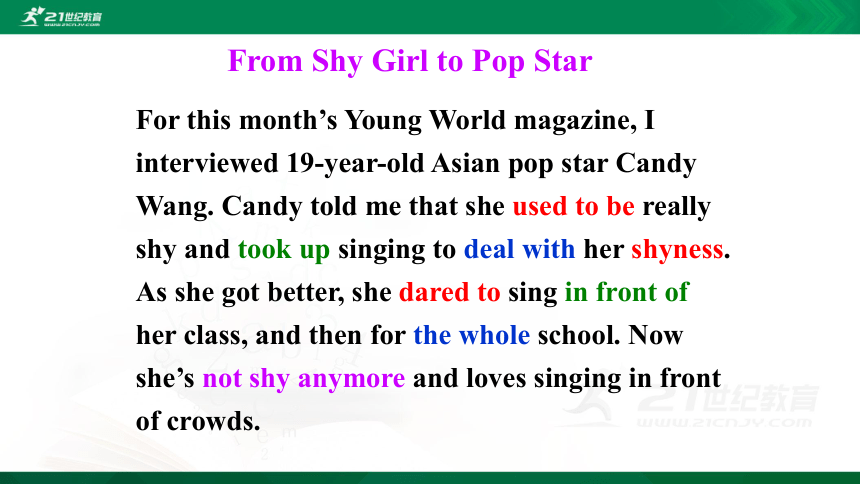
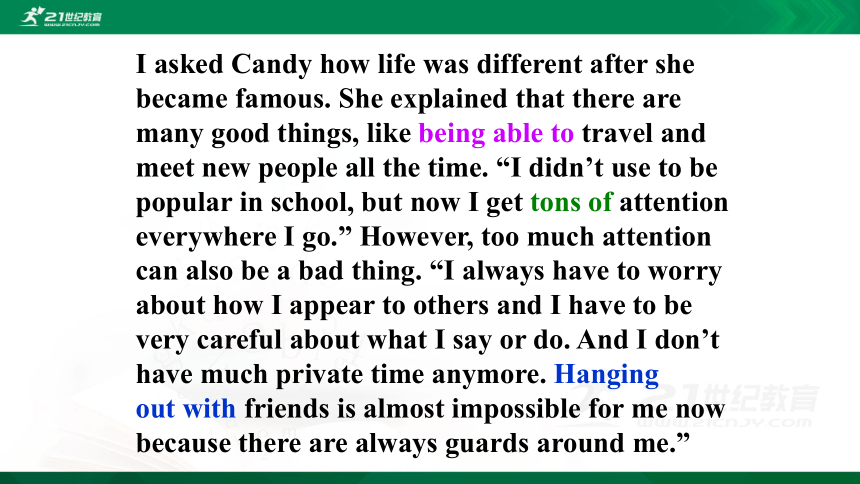

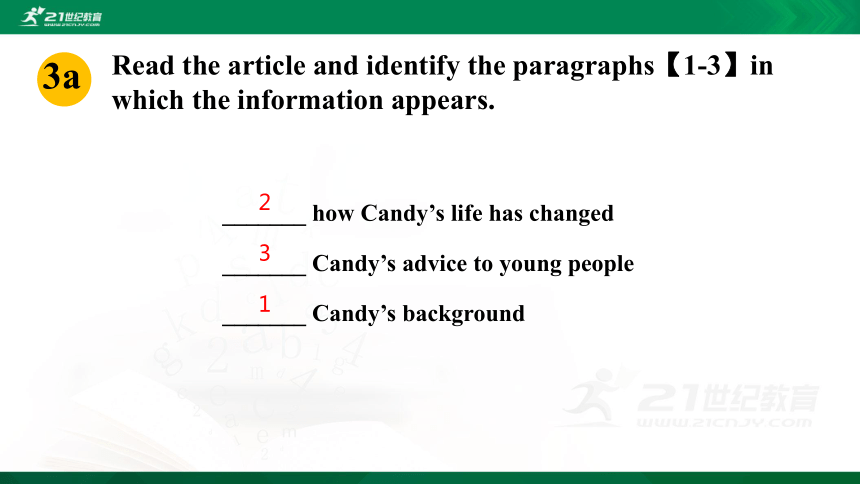
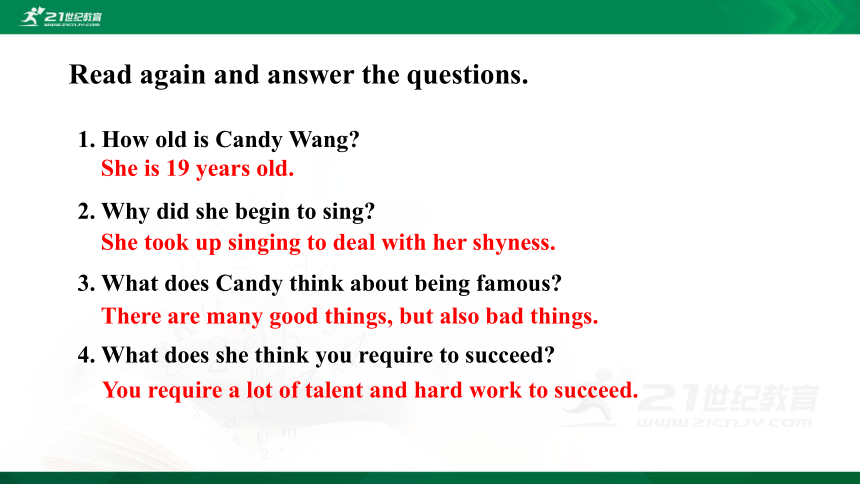
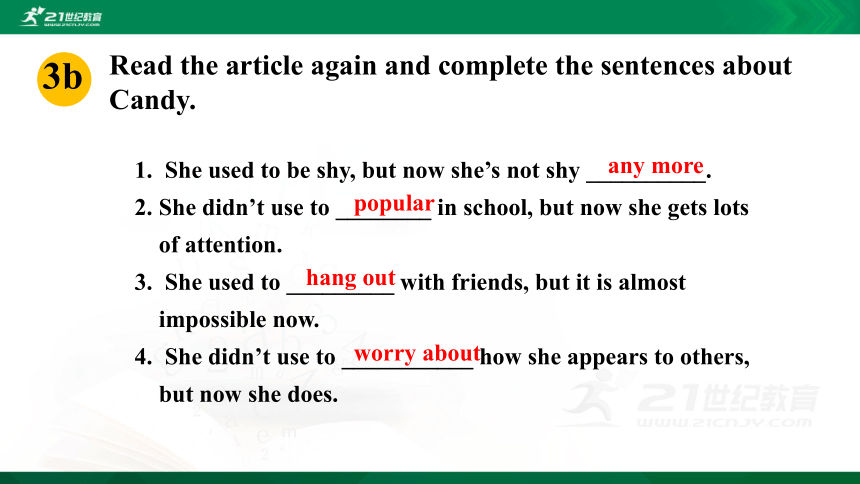
文档简介
(共37张PPT)
人教新目标 九年级全册
Unit 4
I used to be afraid of the dark.
Section A (3a-3c)
Use “used to” and “but now” to describe the following picture.
Review
She used to play soccer, but now she plays tennis.
She used to be short, but now she is tall.
She used to have long hair, but now
she has short hair.
I'm afraid of...
I used to be afraid of snakes. But now I’m not afraid of them. How about you?
______ how Candy’s life has changed
______ Candy’s advice to young people
______ Candy’s background
3a Skim the article and identify
the paragraphs in which the following
information appears. Number the
information [1–3].
3
2
1
For this month’s Young World magazine, I
interviewed 19-year-old Asian pop star Candy
Wang. Candy told me that she used to be really
shy and took up singing to deal with her shyness.
As she got better, she dared to sing in front of
her class, and then for the whole school. Now
she’s not shy anymore and loves singing in front
of crowds.
From Shy Girl to Pop Star
I asked Candy how life was different after she
became famous. She explained that there are
many good things, like being able to travel and
meet new people all the time. “I didn’t use to be
popular in school, but now I get tons of attention
everywhere I go.” However, too much attention
can also be a bad thing. “I always have to worry
about how I appear to others and I have to be
very careful about what I say or do. And I don’t
have much private time anymore. Hanging
out with friends is almost impossible for me now
because there are always guards around me.”
What does Candy have to say to all those young people who want to become famous? “Well,” she begins slowly, “you have to be prepared to give up your normal life. You can never imagine how difficult the road to success is.
Many times I thought about giving up, but I fought on. You really require a lot of talent and hard work to succeed. Only a
very small number of people
make it to the top.”
3a
Read the article and identify the paragraphs【1-3】in which the information appears.
_______ how Candy’s life has changed
_______ Candy’s advice to young people
_______ Candy’s background
1
2
3
Read again and answer the questions.
1. How old is Candy Wang?
2. Why did she begin to sing?
3. What does Candy think about being famous?
4. What does she think you require to succeed?
She is 19 years old.
She took up singing to deal with her shyness.
There are many good things, but also bad things.
You require a lot of talent and hard work to succeed.
3b
Read the article again and complete the sentences about Candy.
She used to be shy, but now she’s not shy __________.
She didn’t use to ________ in school, but now she gets lots of attention.
She used to _________ with friends, but it is almost impossible now.
She didn’t use to ___________ how she appears to others, but now she does.
any more
popular
hang out
worry about
3c Suppose you are the interviewer and
your partner is Candy. Ask and answer questions.
Pair work
What can we learn from Candy to deal with our problems?
Free talk
1. Candy told me that she used to be really shy
and took up singing to deal with her shyness.
坎迪告诉她过去真的很羞涩,开始唱歌是为了
克服自己的羞涩。
Language points
(1). take up
开始;从事
He left a job in the city to take up farming.
他辞去城里的工作,开始务农。
When did you take up Japanese as a second foreign language?
你什么时间开始选修日语作为第二语言?
take up 还有“接受(提议); 占用”等意思
【拓展】
You should take up my suggestion and start saving money.
你应该接受我的建议,开始存钱。
I know how busy you are and I wouldn’t take up too much of your time.
我知道您忙,我不会占用您太多的时间。
Jacky’s mother was surprised to see her son ______ all the food on the table quickly.
A. eat up B. look up
C. take up D. give up
练一练
假如你想从事这项工作,你必须先接受三个月的训练。(take up)
If you want to take up this job, you must first receive three months’ training.
有关take的短语
take off 脱掉;起飞 take away 拿走
take in 吸收,领会 take office 就职
take down 记录;取下 take back 收回
take out 带出;清除
take charge of 负责…
take sth. for granted 认为…是理所当然的
take hold of 抓住…
take pride in 以…为自豪
take the place of 代替…
take turns to do 轮流做…
练一练
The plane will ______ from Beijing Capital Airport and land in London.
A. take up B. take out
C. take away D. take off
(2)deal with 相当于do with, 意为“对付;处理
? How did you deal with the milk?
你是怎么处理那些牛奶的?
? He has learnt to deal with all kinds of difficulties.
do with 与deal with 两者都可以用来表示“处
理”do 侧重于对象,deal 侧重于方式方法。在
特殊问句中,do with 与what 连用,deal with
则与How 连用。
? I don’t know how they deal with the problem.
= I don’t know what they do with the problem.
练一练
你怎么处理那台旧电视的?(两种翻译)
How did you deal with the old TV set?
What did you do with the old TV set?
— ________ did you ________ your pocket money?
— I sent it to the children in Sichuan.
A. What; deal with B. How; do to
C. What; deal to D. How; deal with
(3)in front of 意为 “在......的前面”。
?There is a little child in front of the house.
房前有一个小孩。
辨析 in front of 与 in the front of
in front of : 在……前面,强调在某一物体外
部的前面。
in the front of :“在…… 的前部”,强调在某一
物体内部的前面
(4)whole 形容词,意为“整个的;全部的”,常
用结构为“the+whole+单数名词”。all也有
此意,但语序不同:all用于冠词、所有格
或其他限定词之前;whole用于冠词、所有
格及其他限定词之后。
all the time 总是; 一直
the whole time 全部的时间
all my life 我的一生
my whole life 我的一生
注意
1)如果没有冠词或其他限定词,whole不能与
单数名词连用
? The whole city was burning.
整个城市都在燃烧。
2)whole一般不与不可数名词及物质名词连用。
(误)the whole money/bread
(正)all the the money/bread
2. … like being able to travel and meet new
people all the time.
…像总是能旅行和结识新朋友。
be able to 与 can 都可以表示 能力,意为
“会;能(够)”。
be able to: 表示经过努力达到目的, 可用于
各种时态
can :表示有能力做某事,仅用于一般现在时
和一般过去时
3. I didn’t use to be popular in school, but now
I get tons of attention everywhere I go.”
过去我在学校里默默无闻,但是现在无论我
走到哪里,都得到太多的关注。
(1)tons of 意为“很多的;大量的”,是英语中
一种夸张的表达方式。ton的本义为“吨”。
? He has been late for school tons of times.
他上学屡次迟到。
(2)get…attention 意为“得到/引起......注意”
? He tried to get the attention of a passing
policeman.
他试图引起一位路过的警察的注意。
4. dare
dare用作实义动词时,有时态和人称的变化,用do、does或did来构成否定句或疑问句。
Go ahead and dive if you dare. 如果你敢,尽管跳下水去。
She did not dare to look at him. 她不敢朝他看。
【拓展】
dare用作情态动词, 一般用于疑问句、否定句或条件句, 或与 hardly, never, no one, nobody 等连用。有时态变化,但没有人称形式的变化, 其后接动词原形。构成疑问句和否定句时不用助动词do。
How dare you ask me such a question? 你怎敢问我这样的问题?
We dare not look at her eyes. 我们不敢看她的眼睛。
练一练
I _______ you because I thought I must be wrong.
A. dare not ask B. dare not to ask
C. dare not asking D. dare to not ask
她晚上不敢一个人出去。 (两种翻译)
She dare not go out alone at night.
She doesn’t dare to go out alone at night.
5. make it
make it 在口语当中相当于 succeed,表示“成功、做到、说定、赶上、及时到达”。
I will never make it to a morning class.
早上的课程我总是来不及去上。
I wondered if I would make it to the other side.
我怀疑自己是否能跑到对面。
课堂检测
1. Finish the sentences by using the words in the box.
1. Playing the piano well _______ a lot of practice.
2. The ______ won’t let anyone through the gate without a pass.
guard
requires
require, guard, deal with, background, private
Exercises
3. It’s a _______ garden, not a public one.
4. We know nothing about his ___________.
5. I have a lot of letters to ________ today.
private
background
deal with
require, guard, deal with, background, private
2. Complete the following sentences.
1. Rice is the main food in many _____ (Asia) countries.
2. Young people must dare ________ (think), speak up and act.
to think
Asian
3. Mike tried his best to overcome his _________ (shy).
4. Mr. Li took up ____________ (engineer) ten years ago.
5. It’s ____________ (possible) for us to climb up such a high mountain.
shyness
engineering
impossible
3. Finish the following sentences.
1. 我采访二十四岁的亚洲流行歌手茜拉。
I __________ __________ Asian pop star Shila.
2. 她从事歌唱来解决她的害羞问题。
She ____ ____ singing to _____ ____ her shyness.
interviewed
took up
deal with
24-year-old
3. 我不再有许多个人时间。
I don’t have _____ _______ time ____ _____.
4. 她过去常和朋友一起闲逛。
She ____ ___ _____ ____ with friends.
much private
any
more
used to hang out
谢谢
21世纪教育网(www.21cnjy.com) 中小学教育资源网站
有大把高质量资料?一线教师?一线教研员?
欢迎加入21世纪教育网教师合作团队!!月薪过万不是梦!!
详情请看:
https://www.21cnjy.com/help/help_extract.php
人教新目标 九年级全册
Unit 4
I used to be afraid of the dark.
Section A (3a-3c)
Use “used to” and “but now” to describe the following picture.
Review
She used to play soccer, but now she plays tennis.
She used to be short, but now she is tall.
She used to have long hair, but now
she has short hair.
I'm afraid of...
I used to be afraid of snakes. But now I’m not afraid of them. How about you?
______ how Candy’s life has changed
______ Candy’s advice to young people
______ Candy’s background
3a Skim the article and identify
the paragraphs in which the following
information appears. Number the
information [1–3].
3
2
1
For this month’s Young World magazine, I
interviewed 19-year-old Asian pop star Candy
Wang. Candy told me that she used to be really
shy and took up singing to deal with her shyness.
As she got better, she dared to sing in front of
her class, and then for the whole school. Now
she’s not shy anymore and loves singing in front
of crowds.
From Shy Girl to Pop Star
I asked Candy how life was different after she
became famous. She explained that there are
many good things, like being able to travel and
meet new people all the time. “I didn’t use to be
popular in school, but now I get tons of attention
everywhere I go.” However, too much attention
can also be a bad thing. “I always have to worry
about how I appear to others and I have to be
very careful about what I say or do. And I don’t
have much private time anymore. Hanging
out with friends is almost impossible for me now
because there are always guards around me.”
What does Candy have to say to all those young people who want to become famous? “Well,” she begins slowly, “you have to be prepared to give up your normal life. You can never imagine how difficult the road to success is.
Many times I thought about giving up, but I fought on. You really require a lot of talent and hard work to succeed. Only a
very small number of people
make it to the top.”
3a
Read the article and identify the paragraphs【1-3】in which the information appears.
_______ how Candy’s life has changed
_______ Candy’s advice to young people
_______ Candy’s background
1
2
3
Read again and answer the questions.
1. How old is Candy Wang?
2. Why did she begin to sing?
3. What does Candy think about being famous?
4. What does she think you require to succeed?
She is 19 years old.
She took up singing to deal with her shyness.
There are many good things, but also bad things.
You require a lot of talent and hard work to succeed.
3b
Read the article again and complete the sentences about Candy.
She used to be shy, but now she’s not shy __________.
She didn’t use to ________ in school, but now she gets lots of attention.
She used to _________ with friends, but it is almost impossible now.
She didn’t use to ___________ how she appears to others, but now she does.
any more
popular
hang out
worry about
3c Suppose you are the interviewer and
your partner is Candy. Ask and answer questions.
Pair work
What can we learn from Candy to deal with our problems?
Free talk
1. Candy told me that she used to be really shy
and took up singing to deal with her shyness.
坎迪告诉她过去真的很羞涩,开始唱歌是为了
克服自己的羞涩。
Language points
(1). take up
开始;从事
He left a job in the city to take up farming.
他辞去城里的工作,开始务农。
When did you take up Japanese as a second foreign language?
你什么时间开始选修日语作为第二语言?
take up 还有“接受(提议); 占用”等意思
【拓展】
You should take up my suggestion and start saving money.
你应该接受我的建议,开始存钱。
I know how busy you are and I wouldn’t take up too much of your time.
我知道您忙,我不会占用您太多的时间。
Jacky’s mother was surprised to see her son ______ all the food on the table quickly.
A. eat up B. look up
C. take up D. give up
练一练
假如你想从事这项工作,你必须先接受三个月的训练。(take up)
If you want to take up this job, you must first receive three months’ training.
有关take的短语
take off 脱掉;起飞 take away 拿走
take in 吸收,领会 take office 就职
take down 记录;取下 take back 收回
take out 带出;清除
take charge of 负责…
take sth. for granted 认为…是理所当然的
take hold of 抓住…
take pride in 以…为自豪
take the place of 代替…
take turns to do 轮流做…
练一练
The plane will ______ from Beijing Capital Airport and land in London.
A. take up B. take out
C. take away D. take off
(2)deal with 相当于do with, 意为“对付;处理
? How did you deal with the milk?
你是怎么处理那些牛奶的?
? He has learnt to deal with all kinds of difficulties.
do with 与deal with 两者都可以用来表示“处
理”do 侧重于对象,deal 侧重于方式方法。在
特殊问句中,do with 与what 连用,deal with
则与How 连用。
? I don’t know how they deal with the problem.
= I don’t know what they do with the problem.
练一练
你怎么处理那台旧电视的?(两种翻译)
How did you deal with the old TV set?
What did you do with the old TV set?
— ________ did you ________ your pocket money?
— I sent it to the children in Sichuan.
A. What; deal with B. How; do to
C. What; deal to D. How; deal with
(3)in front of 意为 “在......的前面”。
?There is a little child in front of the house.
房前有一个小孩。
辨析 in front of 与 in the front of
in front of : 在……前面,强调在某一物体外
部的前面。
in the front of :“在…… 的前部”,强调在某一
物体内部的前面
(4)whole 形容词,意为“整个的;全部的”,常
用结构为“the+whole+单数名词”。all也有
此意,但语序不同:all用于冠词、所有格
或其他限定词之前;whole用于冠词、所有
格及其他限定词之后。
all the time 总是; 一直
the whole time 全部的时间
all my life 我的一生
my whole life 我的一生
注意
1)如果没有冠词或其他限定词,whole不能与
单数名词连用
? The whole city was burning.
整个城市都在燃烧。
2)whole一般不与不可数名词及物质名词连用。
(误)the whole money/bread
(正)all the the money/bread
2. … like being able to travel and meet new
people all the time.
…像总是能旅行和结识新朋友。
be able to 与 can 都可以表示 能力,意为
“会;能(够)”。
be able to: 表示经过努力达到目的, 可用于
各种时态
can :表示有能力做某事,仅用于一般现在时
和一般过去时
3. I didn’t use to be popular in school, but now
I get tons of attention everywhere I go.”
过去我在学校里默默无闻,但是现在无论我
走到哪里,都得到太多的关注。
(1)tons of 意为“很多的;大量的”,是英语中
一种夸张的表达方式。ton的本义为“吨”。
? He has been late for school tons of times.
他上学屡次迟到。
(2)get…attention 意为“得到/引起......注意”
? He tried to get the attention of a passing
policeman.
他试图引起一位路过的警察的注意。
4. dare
dare用作实义动词时,有时态和人称的变化,用do、does或did来构成否定句或疑问句。
Go ahead and dive if you dare. 如果你敢,尽管跳下水去。
She did not dare to look at him. 她不敢朝他看。
【拓展】
dare用作情态动词, 一般用于疑问句、否定句或条件句, 或与 hardly, never, no one, nobody 等连用。有时态变化,但没有人称形式的变化, 其后接动词原形。构成疑问句和否定句时不用助动词do。
How dare you ask me such a question? 你怎敢问我这样的问题?
We dare not look at her eyes. 我们不敢看她的眼睛。
练一练
I _______ you because I thought I must be wrong.
A. dare not ask B. dare not to ask
C. dare not asking D. dare to not ask
她晚上不敢一个人出去。 (两种翻译)
She dare not go out alone at night.
She doesn’t dare to go out alone at night.
5. make it
make it 在口语当中相当于 succeed,表示“成功、做到、说定、赶上、及时到达”。
I will never make it to a morning class.
早上的课程我总是来不及去上。
I wondered if I would make it to the other side.
我怀疑自己是否能跑到对面。
课堂检测
1. Finish the sentences by using the words in the box.
1. Playing the piano well _______ a lot of practice.
2. The ______ won’t let anyone through the gate without a pass.
guard
requires
require, guard, deal with, background, private
Exercises
3. It’s a _______ garden, not a public one.
4. We know nothing about his ___________.
5. I have a lot of letters to ________ today.
private
background
deal with
require, guard, deal with, background, private
2. Complete the following sentences.
1. Rice is the main food in many _____ (Asia) countries.
2. Young people must dare ________ (think), speak up and act.
to think
Asian
3. Mike tried his best to overcome his _________ (shy).
4. Mr. Li took up ____________ (engineer) ten years ago.
5. It’s ____________ (possible) for us to climb up such a high mountain.
shyness
engineering
impossible
3. Finish the following sentences.
1. 我采访二十四岁的亚洲流行歌手茜拉。
I __________ __________ Asian pop star Shila.
2. 她从事歌唱来解决她的害羞问题。
She ____ ____ singing to _____ ____ her shyness.
interviewed
took up
deal with
24-year-old
3. 我不再有许多个人时间。
I don’t have _____ _______ time ____ _____.
4. 她过去常和朋友一起闲逛。
She ____ ___ _____ ____ with friends.
much private
any
more
used to hang out
谢谢
21世纪教育网(www.21cnjy.com) 中小学教育资源网站
有大把高质量资料?一线教师?一线教研员?
欢迎加入21世纪教育网教师合作团队!!月薪过万不是梦!!
详情请看:
https://www.21cnjy.com/help/help_extract.php
同课章节目录
- Unit 1 How can we become good learners.
- Section A
- Section B
- Unit 2 I think that mooncakes are delicious!
- Section A
- Section B
- Unit 3 Could you please tell me where the restroom
- Section A
- Section B
- Unit 4 I used to be afraid of the dark.
- Section A
- Section B
- Unit 5 What are the shirts made of?
- Section A
- Section B
- Review of Units 1-5
- Unit 6 When was it invented?
- Section A
- Section B
- Unit 7 Teenagers should be allowed to choose their
- Section A
- Section B
- Unit 8 It must belong to Carla.
- Section A
- Section B
- Unit 9 I like music that I can dance to.
- Section A
- Section B
- Unit 10 You're supposed to shake hands.
- Section A
- Section B
- Review of Units 6-10
- Unit 11 Sad movies make me cry.
- Section A
- Section B
- Unit 12 Life is full of the unexpected
- Section A
- Section B
- Unit 13 We're trying to save the earth!
- Section A
- Section B
- Unit 14 I remember meeting all of you in Grade 7.
- Section A
- Section B
- Review of Units 11-14
